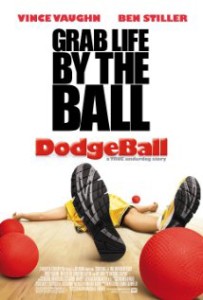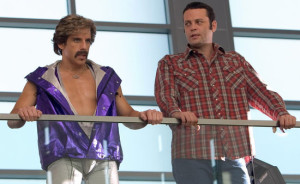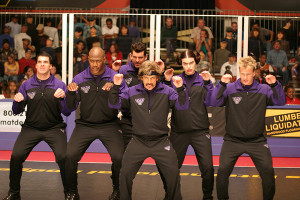 If you can dodge a wrench, you can dodge a ball. And if you can survive a game of dodgeball as a kid, well, you can pretty much survive anything in life. Seriously, is there any sport more humiliating than dodgeball? Teams picking players solely based on who is least likely to lose the game for you, throwing rubber balls at your head as hard as you can, relentless mocking of the losers. Maybe those aren’t the written rules exactly, but as we’re reminded in the only movie made about this sport, it’s all about “violence, exclusion, and degradation.”
If you can dodge a wrench, you can dodge a ball. And if you can survive a game of dodgeball as a kid, well, you can pretty much survive anything in life. Seriously, is there any sport more humiliating than dodgeball? Teams picking players solely based on who is least likely to lose the game for you, throwing rubber balls at your head as hard as you can, relentless mocking of the losers. Maybe those aren’t the written rules exactly, but as we’re reminded in the only movie made about this sport, it’s all about “violence, exclusion, and degradation.”
Dodgeball is one of my favorite comedies, and really it’s one of my favorite movies period. It takes what could easily be a ridiculous concept without substance and turns it into an incredibly fun and hilarious hero’s journey that ends up almost inadvertently examining our eccentricities with quite a keen eye. But that’s what comedy does. And with an expert performance by Ben Stiller as one of his most fully realized characters he’s ever played, as well are similarly realized supporting characters, this is really good comedy. It’s a genre that can often help us examine ourselves better than others; it just happens to do that by laughing at us.
There are few movies I can think of with more eccentric characters than Dodgeball. When they call it a true underdog story, they aren’t kidding. These guys are wacky. I mean, one of them thinks he’s a pirate (garr!). And as I watch this movie I can’t help but remember being a kid, standing in a huddled, awkward mass of peers at P.E. waiting to get picked for a game of dodgeball. The personalities in that group of kids were as varied as they come. As many things in childhood are designed to be before they’re turned into comically degrading violence, it is a microcosm of life. Truly, we’re all weird. We can’t escape that, and in fact it is what makes us all beautiful, though we don’t like to admit it.
Despite our attempts to be otherwise, we are all Steve the Pirate.
 In this film the central conflict is between Peter LaFleur and White Goodman, and while they are two very different characters, they each arrived where they are by starting at the same point. They both have a serious case of self-loathing and handled it in different ways. White was 600+ lbs and addicted to food, so he worked to sculpt himself into his ultimate self-image. Peter battled self-loathing as well, and though it is less clear in the film, you can see it all over his face from the start. His decision was to be apathetic, letting everything in his personal and professional life go.
In this film the central conflict is between Peter LaFleur and White Goodman, and while they are two very different characters, they each arrived where they are by starting at the same point. They both have a serious case of self-loathing and handled it in different ways. White was 600+ lbs and addicted to food, so he worked to sculpt himself into his ultimate self-image. Peter battled self-loathing as well, and though it is less clear in the film, you can see it all over his face from the start. His decision was to be apathetic, letting everything in his personal and professional life go.
Kate: “I’m curious, is it strictly apathy, or do you really not have a goal in life?”
Peter: “I found that if you have a goal, that you might not reach it. But if you don’t have one, then you are never disappointed. And I gotta tell ya… it feels phenomenal.”
Peter says this jokingly of course, but does it with that painful twinge of “might not be joking on the inside.” It’s easy to view Peter as the every day guy, as if we are to relate to him as our journeyman through the film. But the film subverts the norm by surrounding him with an interesting array of characters that we care far more about than our “average Joe” Peter.
The kaleidoscope of these characters becomes the hero of the film; the team is who we root for. And that is community. We are one body with many parts, all wanting to be known and accepted despite our eccentricities. And sometimes we have to band together to throw balls at other people’s heads.
 Through Peter we see the power community has to transform us. His goal-less existence was given purpose within his community. His team cares for each other (in their own ways) and are successful only when they co-exist. Conversely, White Goodman hires his team of muscle, which is only an extension of his psyche- himself defiantly grabbing the bull by the horns (it’s a metaphor. He read about it- in a book!) And so despite having what seems to be a community, he’s actually alone.
Through Peter we see the power community has to transform us. His goal-less existence was given purpose within his community. His team cares for each other (in their own ways) and are successful only when they co-exist. Conversely, White Goodman hires his team of muscle, which is only an extension of his psyche- himself defiantly grabbing the bull by the horns (it’s a metaphor. He read about it- in a book!) And so despite having what seems to be a community, he’s actually alone.
But of course, Dodgeball is amazing because it doesn’t take any of this that seriously. People are hit in the face with wrenches (and many, many rubber balls), bounced through traffic like a pinball, mercilessly insulted, and face all manner of ridicule throughout the movie. But it does prove that no matter how weird we are and different from each other (even if you think you’re a pirate) community is powerful, and we are greater together than apart. Just remember to dodge, duck, dip, dive, and dodge.
White Goodman: Hope you’re all happy now. Good guy wins. Bad guy loses. Big friggin’ surprise… I love happy endings. You know, that’s the problem with the American cinema: Can’t handle any complexity in it. “Don’t make me think! I just want to be entertained.”

